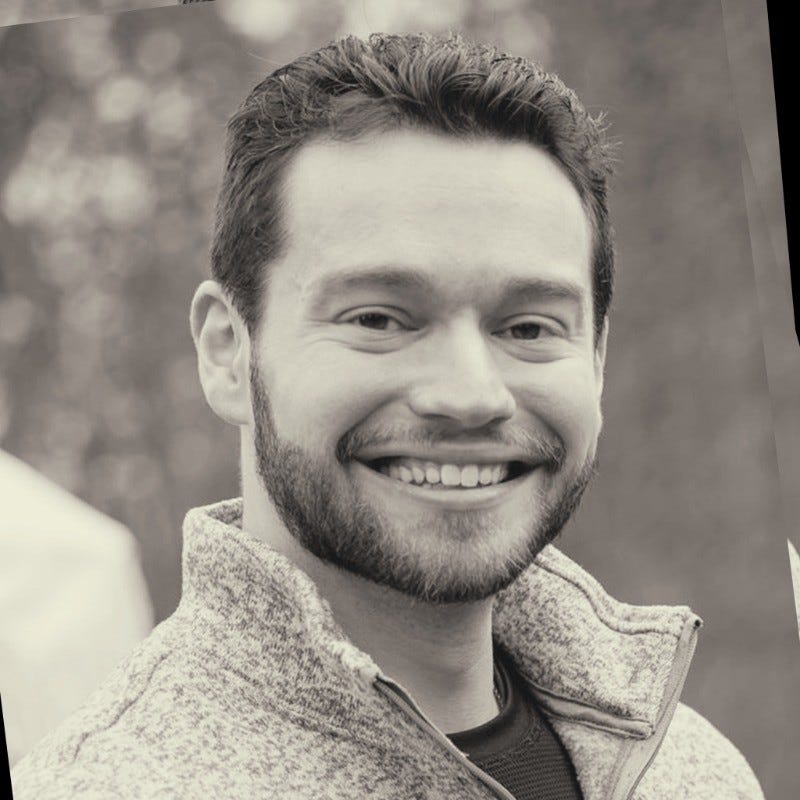Resilience Spotlight: Tyler O'Shea
On how we can find positive role models to help us through life's challenges
Today, I am excited to share my interview with Tyler O’Shea, founder of the sports media platform Joker Mag (named after his dog, Joker) and The Underdog newsletter.
The Underdog features stories of sports stars who have overcome the odds to succeed on the world’s biggest stages. As Tyler puts it, “By shedding light on positive sports stories, we hope to share lessons and inspire our readers to overcome the adversity they're facing in their own lives.”
I’m a rabid sports fan and love to read these types of stories, which is why I reached out to Tyler for this interview. But even if you aren’t a sports fan, I think you’ll get a ton out of his answers, especially his advice on finding role models.
Finding someone who’s been through what we’re going through is a tremendous confidence boost. Sometimes, just seeing that it’s possible to get through our struggles and challenges can help us change our outlook on life. This is what happened to me several years ago when I sought out role models for the first time.
Tyler lives just outside of Philadelphia. Although Boston and Philly sports fans normally don’t get along, I’m happy to say he’s a great guy.
Below is our email Q&A.
Thank you Tyler for sharing your story! (And to Chenell Basilio of Growth in Reverse for the connection.)
1. Can you tell us about the origin story of The Underdog? How did the idea for the newsletter come about?
The idea started way back when I was a short and scrawny 13-year-old going out for the 7th-grade baseball team.
I was easily the smallest guy at tryouts. The bat was too heavy for me, and I was taking crow-hops from shortstop to make sure my throws reached the first baseman.
On the final day of tryouts, the coach slammed his door shut in the locker room. On the back of it, facing all of us, was a list of names – the guys who made the team. I scanned the list up and down, down and up, and went back over each name about ten times before reality hit me.
I got cut.
Being that my entire life up was centered around baseball and my unrelenting love for it, this moment crushed me. My dad still talks about what it was like to pick me up that day.
In the weeks that followed, I started going up to my parents' computer room every day after school to research the stories of professional baseball players who were undersized – Tim Lincecum, Dustin Pedroia, David Eckstein, and more.
Their stories gave me hope. If they could overcome being “too small” to play, I could too.
So I stuck with it. I made the team the next year as a bench player, then slowly worked my way up each year. I ended up playing baseball at McDaniel College and was named an honorable mention on the all-conference team my senior year. I made it a lot further than my 7th-grade coach ever thought I would.
After graduation, I thought “Why not start a website that puts all these underdog stories in one place?” I wanted to give people the same feeling I felt when I was that undersized kid fighting to keep my dream alive.
As of today, we’ve published more than 400 stories about the best underdog stories in sports. The site has done over 1 million pageviews since 2021, but the thing that means the most is the impact these stories are making on our readers’ lives. A heartfelt reply from a subscriber means so much and tells me I’m on the right path.
2. Are there any common characteristics, mental traits, or habits that underdogs share? What types of actions do they take?
Here are a few of the most common traits I see in the underdogs we’ve covered:
They don’t fall into self-pity or feel sorry for themselves.
Regardless of how bad of a hand they’ve been dealt, they don’t make excuses.
They stick to their vision, regardless of what anyone says.
They embrace failure and treat it as a learning opportunity, rather than a sign to quit.
They are consistent and relentless. Even with a jam-packed schedule full of commitments, they still find time to make progress toward their goals.
3. How do role models help us persevere through adversity?
For me, it was about finding proof that my dream was possible. If you can find someone in a situation similar to yours and see that they achieved what you want to achieve, why would you not believe you can do it too?
That's why it’s so important to me that we cover stories of people from all backgrounds and walks of life. Eventually, I’d like to broaden out to cover inspiring stories outside of sports too.
4. For someone who might be going through a tough time, do you have any advice for how they can find a role model?
Start searching for stories related to your specific situation – that’s exactly how I found the stories of the undersized MLB players I came to idolize. If I never found those stories, I don’t know what would’ve happened.
Search engines, forums, social media platforms, and newsletters are all potential places you can look through. Heck, even using an AI chatbot like Gemini, Claude, or ChatGPT can help lead you to the right people.
The internet is massive, and chances are at least one person is going through something similar.
If you exhaust all resources, and can’t find exactly what you’re looking for, feel free to contact me (founder@jokermag.com) and I’ll do my best to help.
5. What are the best ways to emulate a role model?
My advice would be to find what you view as the person's most admirable traits. For me, it's usually a person's mindset and approach to life.
In a semi-sports-related example, no one can be exactly like David Goggins. But we can try to embody a slice of his fearlessness. Goggins is always looking for the next challenge and continually puts himself in increasingly difficult and uncomfortable positions.
In the example of Ali Truwit, she had something extremely rare and devastating happen to her. (Losing part of her leg in a shark attack.) Yet, she dug deep to find the bright side and now she'll be competing in the Paralympic Games this summer. What is a negative event you've experienced recently and how can you transform it into a positive?
I try to extract lessons from every story I come across and apply them to my own unique situation.
6. What are the most compelling sports underdog stories you've come across over the years?
We’ve covered so many that it’s hard to pick the one or two most compelling stories. But here are 3 that come to mind:
Michael Lewis: Meet The Budweiser Truck Driver Who Became An NFL All-Pro
Ali Truwit: Comeback From a Shark Attack
Howie Roseman: From Unpaid Intern Who Never Played Football To The NFL’s Most Powerful GM: The Unlikely Journey Of Howie Roseman
7. Is there anything else you'd like to share?
Thank you, Chris, for giving me a platform to share my story. I really appreciate this opportunity.
I’d love to share one quote that I constantly come back to. It’s from Kalif Raymond, a football player who sent out 800+ emails during his fight to find an opportunity to play in college and, ultimately, make it to the NFL.
“The person you want to become has to mean more to you than the person you are now.”




















Sort of an underdog story: I have Bethlem myopathy, a mild neuromuscular disease that didn't have a name until I was in my 70's. My father, his sister, and my father's mother all had it--doesn't kill anyone and is genetically dominant. Recently I found my long-deceased father's high school yearbook and discovered he was captain of his high school basketball team. Whether that was an elective position, or the coach made him captain because that's the only useful thing he could do for the team, I'll never know. He wasn't tall enough for a basketball player (roughly average height), could not have run fast enough or tossed a ball strongly enough, to help the team that way, but he did have excellent organizational and people skills, as proven by his career in basic biological research and the respect shown by his colleagues and students. He may not have "made" the team, but he certainly helped make it!
I can relate to all those common traits in my own journey of overcoming chronic ill health to the extent I have. I’ve read a little into Olympic athletes and top sports professionals (like Roger bannister who broke the 4 minute mile record) and I identify so much with their approach and commitment, one that always stands out is they don’t ask “is this proven” it’s more a question of “will this work?”